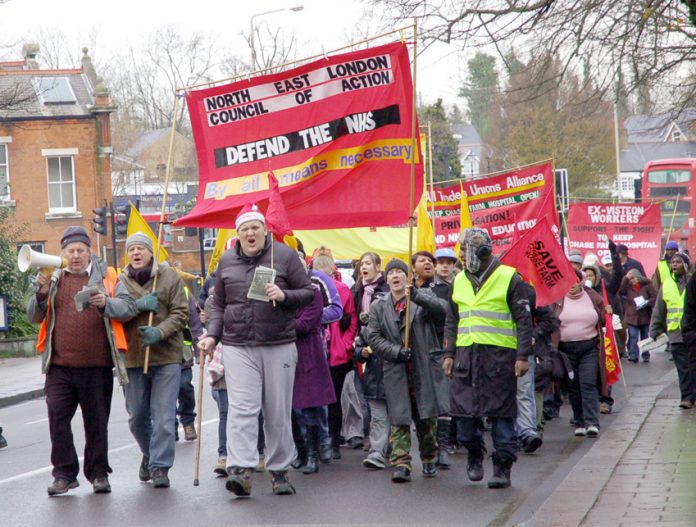
The scale and pace of the government’s planned NHS ‘reforms’, combined with £20bn cuts, is ‘extremely risky and potentially disastrous, warned the leaders of six health unions yesterday.
Ahead of the new Health Bill’s publication tomorrow, they wrote in a letter to the Times newspaper: ‘Radical reform of the NHS in England is expected to come a major step closer this week, with publication of the Health and Social Care Bill.
‘As unions and professional organisations representing the 1.3 million staff who make up the NHS, we are extremely concerned that the government is not heeding the warnings about key elements of the proposals.
‘We recognise the need to provide NHS services more cost-effectively, but we believe this can and must be achieved without taking unnecessary risks and damaging care.
‘One of the major concerns is the role that the NHS’ economic regulator, Monitor, will be given to ensure that any willing providers, including NHS and voluntary organisations, and commercial companies, are able to compete to provide all NHS services.
‘In addition, the 2011/12 operating framework for the NHS, published last month, revealed that providers will be able to offer services to commissioners at less than the published mandatory tariff price.
‘There is clear evidence that price competition in healthcare is damaging.
‘Research by economists at Imperial College shows that, following the introduction of competition in the NHS in the 1990s, under a system that allowed hospitals to negotiate prices, there was a fall in clinical quality.
‘With scarce resources there is a serious danger that the focus will be on cost, not quality.
‘Enforced competition will also make it harder for NHS staff to work collaboratively in multi-disciplinary teams, across organisational boundaries, to create the integrated care pathways that patients want and need, and that will help make services more efficient.
‘Furthermore, the sheer scale of the ambitious and costly reform programme, and the pace of change, whilst at the same time being tasked with making £20 billion of savings, is extremely risky and potentially disastrous.’
The letter is signed by Dr Hamish Meldrum of the BMA, the RCN’s Dr Peter Carter, Karen Jennings, National Secretary Health, Unison, Karen Reay, National Officer, Health, Unite the Union, RCM leader Cathy Warwick and Phil Gray, Chief Executive, Chartered Society of Physiotherapy.
In a speech yesterday, Cameron attempted to justify the planned ‘reforms’.
Speaking in a personal capacity, BMA Council member Anna Athow said: ‘The union leaders’ expressions of concern are a pale reflection of the anger of their 1.3m members who face job losses, pay freezes and the mothballing of hospitals and other NHS units.
‘Even the employers organisation, the NHS Confederation, made it clear that the only way that a quarter of the NHS budget could be cut while opening the NHS up to outsourcing to the private sector, would be through mass hospital closures.
‘It is clear from Cameron’s interview with the BBC this morning that the Tory coalition is forging ahead as fast as possible to create facts on the ground in the form of GP commissioning consortia “pathfinders” before the Bill has even been put to parliament.
‘Instead of making pleas to the Tories to “listen”, these leaders should be holding urgent special conferences of their members and mobilising actions to defend every NHS hospital and facility and keep it in the public sector and defend every job.
‘This privatisation health bill must be defeated.
‘The whole working class must be mobilised in a general strike to put an end to this rich man’s government which is committed to destroying the NHS.
‘Hospitals threatened with closure must be occupied to maintain comprehensive secondary care services in the area and preserve the expertise of clinical teams which have taken years to build.
‘GPs must preserve their rights to promote and prescribe what the patients need, not be rationing agents for central government.’